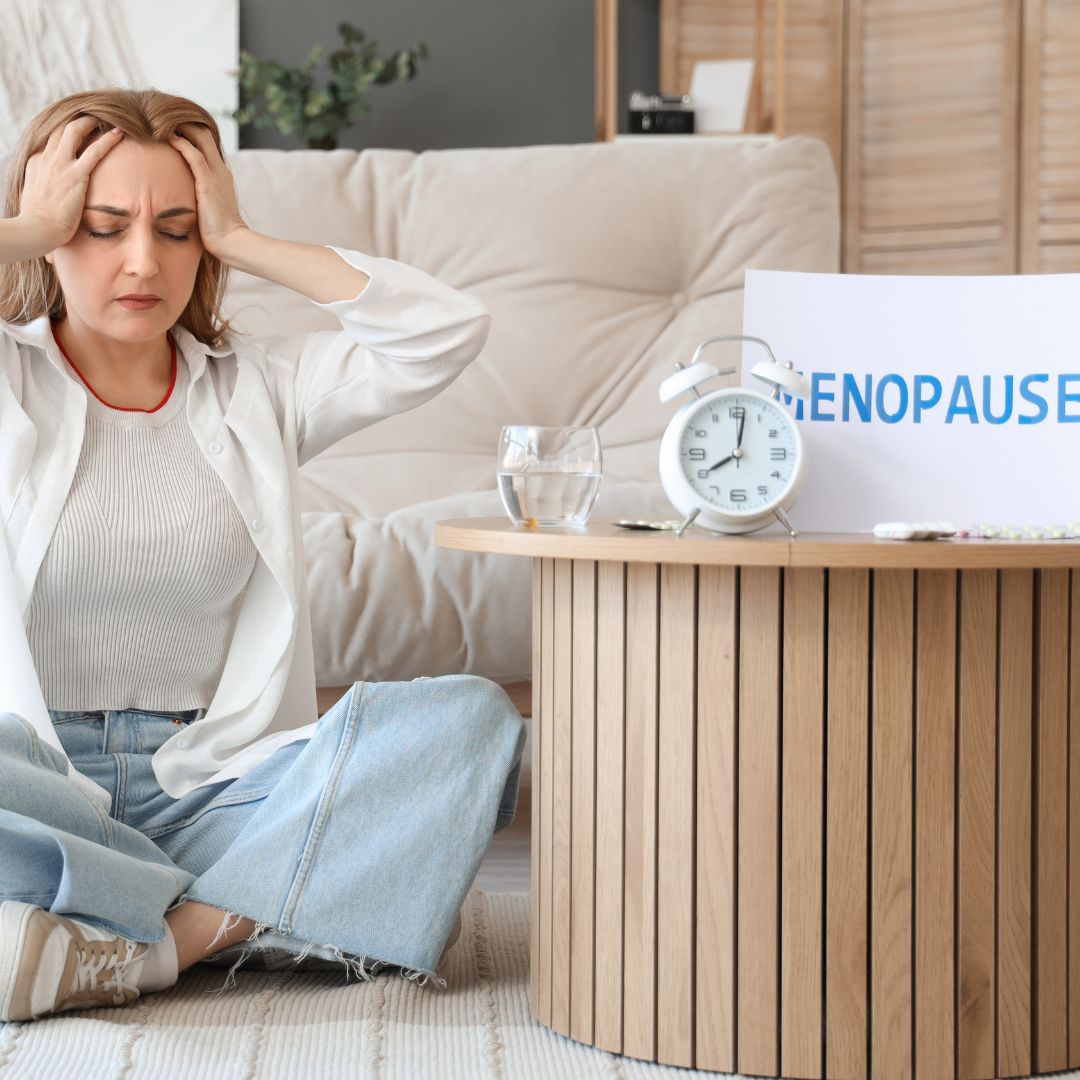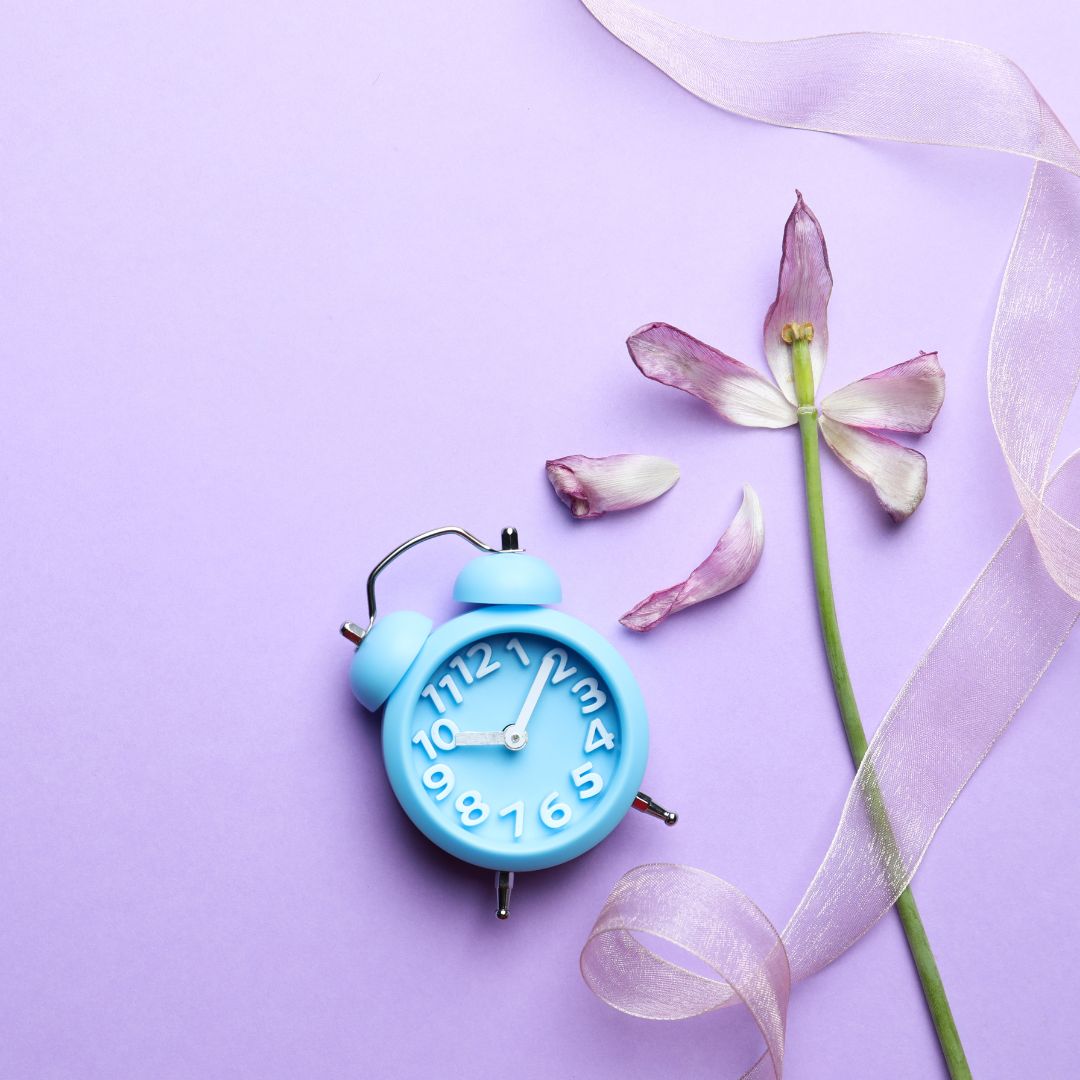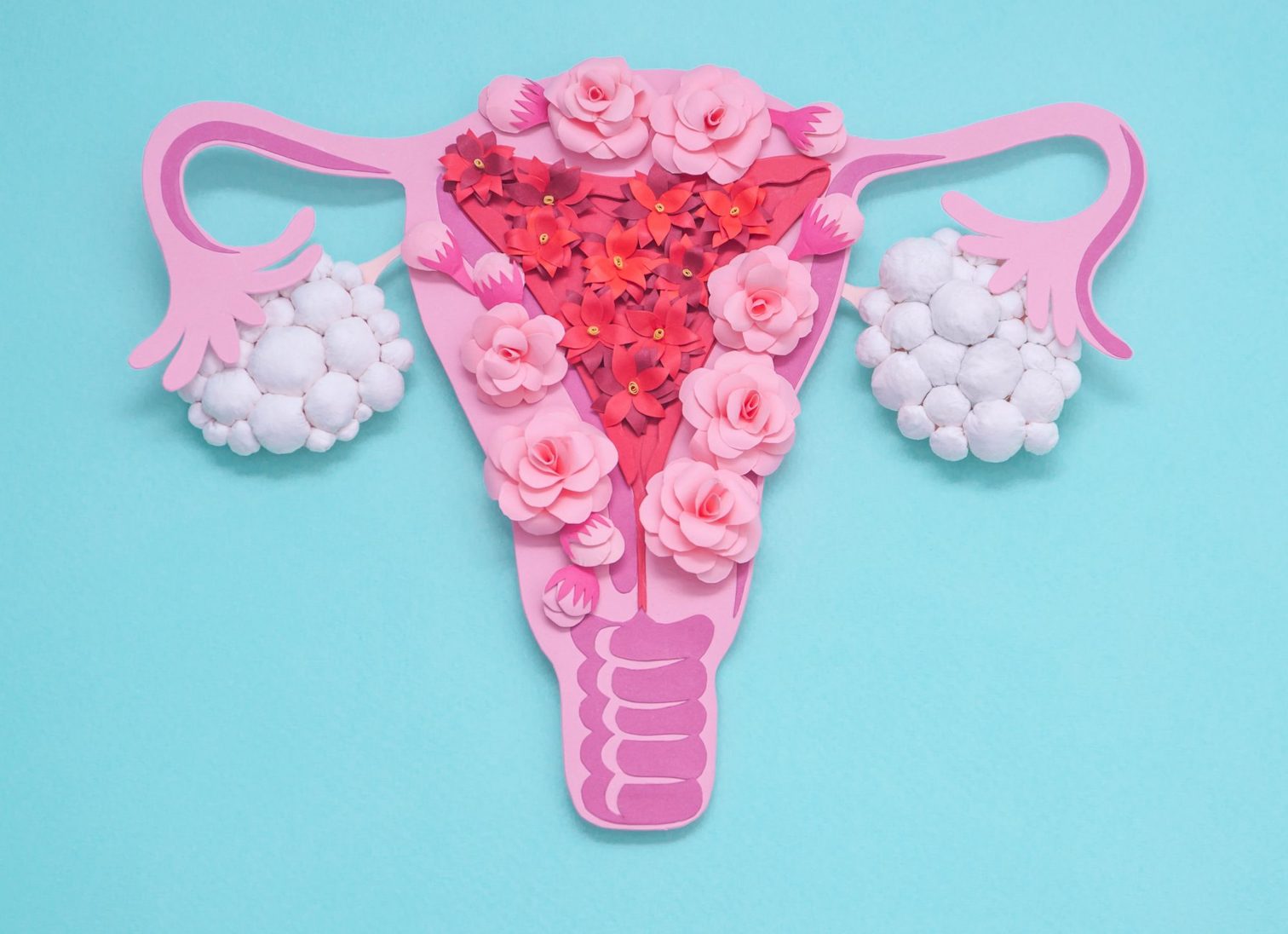
How to regain your sense of calm in perimenopause
Palpitations, a dry mouth, sweating, insomnia are just some of the unmistakable signs of anxiety. Everyone has experienced these symptoms at some point in their life. Who hasn't felt stage fright before a presentation, hyperventilated before an exam or spent a sleepless night before their dental appointment? But when we enter perimenopause, this is one of the most common symptoms that women suffer from – and it can be incapacitating.
So, where does nutrition come into it? At first glance, it may seem preposterous to say that diet influences how we feel; but think about it: In the cold, hard light of science, feelings are chemistry!
Of course, in the first instance, it is our environment, our experiences, and to an extent, our personality that makes us feel the way we feel. But our feelings of fear, anger, overwhelm or love and confidence trigger the release of hormones in our body, which is where chemistry kicks in.
We need the happy hormone serotonin and the pleasure hormone dopamine to feel good, the sleep hormone melatonin to sleep, the stress hormones adrenaline and cortisol for our get-up-and-go and to fight or flee when we’re under threat. Hormones work in unison with each other. Some hormones suppress others; some trigger the release of others. But for these feedback mechanisms to work, for our body to even be able to manufacture the chemicals that we need, we must supply the raw materials they are made of.
Those raw materials are fatty acids, proteins, vitamins, minerals, and phytonutrients – nutrients. What’s more, even our friendly gut bacteria contribute to how we feel by extracting more nutrients from our food for us, manufacturing some, such as short-chain fatty acids, from scratch and even providing some ready-made serotonin! So, if you think of feelings that way, what we eat is bound to have a massive impact on how we feel and how we cope with the challenges life throws at us.
Don't get me wrong; I’m not saying that diet will cure an anxiety disorder. However, if we try and fuel our body with poor quality food that does not provide the building blocks of the hormones and catalysts our brain chemistry requires, we’ll have a much harder time overcoming mental health issues.
So, what are these nutrients our body needs, particularly when we are anxious?
Magnesium is often referred to as ‘nature’s tranquiliser’ – which hints at just how crucial this mineral is for supporting balanced mood, relaxation and deep sleep. One reason why magnesium helps us cope with anxiety might be that it plays a role in nerve transmission. The mineral is not even hard to find. There’s some in most foods, particularly in green leafy vegetables – think broccoli, spinach, kale, and watercress – but also in grains, such as brown rice, buckwheat and quinoa, nuts and seeds, or fish and seafood. Despite this, deficiency is common, which may have something to do with our penchant for convenience and junk foods that are just not as nutritious as real food.
L-theanine – in a 2019 study found that this amino acid might help manage anxiety and support a balanced stress response. L-theanine is found in green tea. It increases the activity of the neurotransmitter GABA, which has calming, anti-anxiety effects. The amino acid also raises dopamine and the creation of alpha waves in the brain.
This is because l-theanine can cross the blood-brain barrier, a membrane that protects our brain from unwanted and harmful substances. The high intake of green tea by Buddhist monks may contribute to their famously calm demeanour and intense focus during meditation. If you want to give green tea a try, be sure to choose an organic one to reduce your exposure to pesticides and other toxins, which have been found to disrupt the brain’s stress circuitry.
Omega-3 fats - the authors of a 2020 research review agree that the role of nutrition in the management of mental health disorders is underestimated. They reviewed the existing research into in connection with anxiety and found that this type of fat is critical for brain health and has been shown to reduce anxiety symptoms.
As vegan diets are becoming more popular, it is important to note that omega-3 fats from plant sources, such as flaxseed oil or walnut oil, does not cover our daily requirements, let alone achieve therapeutic levels. The omega-3s these foods contain are inferior to the ones we need: EPA and DHA. Although the body can make those long-chain fatty acids can from plant-source omega-3 (alpha-linoleic acid or ALA), the conversion is sluggish and easily disrupted. Only about 5 per cent get converted. If you are vegan, do not like fish, or are allergic to it, your diet alone will cover your needs. I recommend finding a good-quality supplement with omega-3 from marine sources (i.e., algae), which is the only vegan source of DHA.
When talking about anxiety and nutrition, we must not neglect the role of the microbiota, the friendly bacteria in our gut. The majority of available research studies in 2019 showed that it is beneficial to give our gut bacteria some TLC. Interestingly, “non-probiotic interventions were more effective than the probiotic” ones.
That suggests that just popping a probiotic capsule may not be enough – and that’s no surprise, really. Don't get me wrong; probiotics are beneficial; there is no doubt about that. However, their contents – live bacteria, e. g. Lactobacillus and Bifidobacterium species – are not going to settle in the gut. They are only travelling through, and while doing so, they help create a bacteria-friendly climate and temporarily crowd out undesirable microbes. But really, they are only lending a helping hand to our own, indigenous bacteria. Those are the ones that are at home there, and those are the ones that can protect our gut, feed our brain, improve our mood, and keep us healthy.
You can look after your friendly bacteria by giving them real food, especially fibre-rich plant foods, including vegetables, fruit, nuts, seeds, pulses, whole grains, herbs, and spices. Variety is key here. While probiotics – especially in the form of fermented foods like sauerkraut, kimchi, live yoghurt, kefir and kombucha – are great, prebiotics – fibre – are even better. We still need to learn much more about all the different microbes living in our guts, but what we do know is that the more different species we have, the healthier we are. How do we cultivate a variety of species? By keeping our diets interesting! Different microbes have different preferences. By varying what we eat, we are creating a desirable place for them to live.
To keep everyone happy, it is also essential to avoid what harms the microbiota. Alcohol acts like a weedkiller on your internal garden. Food additives reduce a protective type of antibody called secretory immunoglobulin A (or sIgA, for short), and emulsifiers are particularly damaging for the gut. Sugar promotes yeast overgrowth, which can overwhelm the beneficial bacteria and make it difficult for them to adhere to the gut wall.
Of course, although hugely important, diet is not everything. Lifestyle factors, too, play a crucial role in mental health. It will come as no surprise that it is worth reducing stress as much possible if you suffer from anxiety. Interestingly, stress also damages the microbiota and interferes with the conversion of omega-3 fatty acids – among many other things, so just getting on top of stress will do you a whole lot of good.
I know that that is easier said than done, but there is a shedload of information on stress management on the internet, ranging from relaxation techniques, such as meditation or breathing exercises, to self-care and me-time tips.
So, as you can see, you don’t have to take anxiety attacks lying down. There is a lot that you can do to avoid them or to aid your recovery. And if you’d like to get in touch about a personalised programme, feel free to book a call.

How to turn ‘not tonight’ into every night
(and 6 foods to get you in the mood)
Lost your mojo? One of the more common symptoms I see from clients in perimenopause is low libido. Here are some of my top tips to boost your sex drive and feel great in bed again.
It’s something I see a lot in clinic. For women, having sex is often far more complicated than just feeling “in the mood”. When we’re spinning so many plates (from children, work, partners and social life, not to mention caring for elderly parents and demanding PTAs), sex is often last on the ‘to-do’ list.
Throw into the mix low self-esteem, lack of body confidence, stress, relationship problems and hormonal issues, it’s no wonder that 57% of women say they prefer Facebook to sex.
Certain medication including anti-depressants, blood pressure drugs and even the Pill can also add to low libido. But after years of working with people who want to enjoy sex again, I can reveal the majority of low sex drive is due to misfiring hormones. The good news is resolving hormonal imbalances can help you get your mojo back!
Here’s how it works: when your hormones are out of whack, your libido takes a nose-dive. But when your menstrual cycle is working properly, the clinical changes in oestrogen levels mean you’ll have a few days a month when you feel naturally sexy (nature’s way of helping you get pregnant). So you’ll probably feel in the mood about 14 days before your period.
For women going through the transition to menopause (the five or so years run-up known as perimenopause), when oestrogen levels dip, your sex drive does, too. It doesn’t help that intercourse at this time can often feel uncomfortable – a massive passion killer.
Low libido can also be down to thyroid disease. If you have (or think you have) an underactive thyroid, this will all sound familiar. Synthetic thyroid hormone medication can resolve this, although it doesn’t work for everyone.
You can also try eating these six sexual energy-boosting foods to turn that ‘not tonight’ into every night…
BROCCOLI – eating this vitamin C-rich vegetable has been shown to boost circulation and sex drive.
WATERMELON – this contains lycopene, citrulline and beta-carotene, which relax blood vessels and creates a natural Viagra effect.
AVOCADOES – packed with nutritious goodies, including desire-boosting potassium and folic acid, which helps with stamina. They also contain vitamin B6, which research shows can decrease symptoms of premenstrual syndrome (such as fatigue, bloating and irritability). This might make it easier for you to feel “in the mood”.
EGGS – one of nature’s superfoods, bursting with B vitamins, including B6 that helps balance hormones and beat stress – which means you will be more in the mood.
STEAK – women who have a high sex drive often have higher levels of the ‘male’ hormone testosterone. So, fill up on steak – it’s rich in zinc, known to boost libido by blocking an enzyme that converts testosterone to the ‘female’ hormone oestrogen.
MACA - a libido-boosting herb from Peru that is proven to boost sex drive as well as fertility thanks to its high iodine and zinc levels. Research into maca has also found it can relieve symptoms associated with the perimenopause, including lack of vaginal lubrication and hot flushes. You can eat maca as a supplement in tablet form or in a powder, which you can add to cereal, soup, yoghurt or - my favourite - a smoothie.
Don’t just put up with a lack of libido – it’s a vital sign that things are not quite as they should be with your hormones. If you’re feeling that perimenopause is taking its toll, or you have other hormone issues, why not get in touch?

Spotlight on Menopause
We have World Menopause Day this month, so it’s a great time to focus on this life stage. As a Nutritional Therapist who specialises in gut and hormone health, this is an area I work on a lot. So, can nutrition and lifestyle medicine really help you have a better menopause? In this blog, I’ll be giving you 5 things you can do to support your body right now.
Perimenopause is a significant journey in a woman’s life, bringing with it a variety of changes (and challenges) both physically and emotionally. These changes can feel overwhelming at times and, although social media is full of memes about how awful the transition to menopause is, the good news is that nutrition and lifestyle medicine can play a powerful role in helping you navigate this stage of life with greater ease.
This isn’t a conversation about whether you should take HRT. That is a conversation between you and your doctor. Regardless of whether you can, do, or even want to take replacement hormones, the answer to hormone harmony lies in the food you eat and how well you look after your body.
In this blog, I’ll share five practical steps you can take right now to support your body during perimenopause. But before we start, there are some things to get straight.
What is perimenopause and am I in it?
You don’t have to wait for hot flushes, brain fog or night sweats to take over to be in perimenopause. ’Perimenopause’ is the transition to menopause (when you’ve not had a period for a year), and it can last five to ten years. That might not mean five to ten years of symptoms. Since the average age of menopause is 51, if you’re in your mid 40s, whether you’re experiencing severe symptoms or not, you will be in perimenopause. You do not have to wait for a doctor to ‘diagnose’ you with perimenopause to start making changes that will benefit you.
What comes after menopause?
Menopause is a single day - the day you are 12 months since your last period.
After menopause, you are postmenopausal. Many women will find their symptoms ease off at this point, while others will experience ‘menopausal symptoms’ for a little longer.
Is HRT the only way to manage menopause?
HRT involves replacing one or more of the hormones your body used to make in plentiful supply in your younger years. These are commonly oestrogen and progesterone together, sometimes only oestrogen, and sometimes you might be prescribed testosterone as well.
While taking HRT is the only way you can actually replace lost hormones, many of the symptoms of menopause experienced at this time can be managed by changing your diet and tweaking your lifestyle.
What are the main changes I need to know about? Oestrogen, one of the main female hormones, provides you with protection from cardiovascular disease and osteoporosis, among other things.
Lower oestrogen levels are also linked to insulin resistance and this, along with declining muscle mass as you age, has an impact on your body’s response to the food you eat.
Declining oestrogen also impacts how your body handles stress. Essentially, you become less resilient to stress as you get older. What this means for you is that you will need to do things a little differently than you did before.
But the message I want you to take from this is that, now knowing where you might be vulnerable, you are forearmed and can tweak what needs tweaking to minimise or improve any symptoms you might be having.
Here are my 5 top tips:
Maintaining stable blood sugar levels is crucial during perimenopause. Fluctuating blood sugars can lead to energy crashes, mood swings, and increased cravings, all of which can make menopausal symptoms feel more intense.
The Mediterranean diet is renowned for its health benefits for all kinds of ills and especially for women going through perimenopause.
This diet emphasises whole foods that are rich in nutrients, antioxidants, and healthy fats, all of which can support hormonal balance and reduce inflammation (the latter also rises during this stage of your life).
Key components of the Mediterranean diet:
Phytoestrogens are plant-based compounds that can mimic the effects of oestrogen in the body, helping to balance hormone levels naturally during menopause. Including these in your diet may help reduce hot flushes and other menopausal symptoms.
Sources of phytoestrogens:
Your body in perimenopause is less resistant to stress so you will need to ensure you make stress relief important in your daily life rather than something you will add to your list of chores and get to it if you have time.
Stress can exacerbate perimenopausal symptoms, so it’s important to find ways to counteract its effect. Chronic stress can lead to hormone imbalances, sleep disturbances, and weight gain.
When I say stress, this does not have to mean the ‘big stuff’ like bereavement, divorce or a house move. The relentlessness of day-to-day worries is just as important.
Stress relief techniques:
Sleep disturbances are common during perimenopause, but getting adequate rest is essential for overall health. Poor sleep can worsen symptoms like mood swings, fatigue, and weight gain. It’s not just the amount of time you spend in bed that matters but the sleep you’re getting and the quality of your sleep.
The most restorative sleep is deep sleep, and you stand the greatest chance of getting more of this when you go to bed before midnight, according to The Sleep Foundation.
Tips for better sleep:
As you navigate perimenopause, remember that your body has unique needs, and small changes can make a big difference. Nutrition and lifestyle medicine can help support your body through this transition and improve your overall wellbeing.
Just as a little reminder, I’m a nutrition practitioner dedicated to supporting women through perimenopause and beyond. If you’d like to discover how I can help you, I offer a free call where we can discuss your needs and explore the best ways I can support you on your journey.

We often hear about the toxins in the environment, but what are they and how do they really affect us? There’s one group that can be particularly nasty for women, especially if we already have some hormone imbalances such as PCOS, or we’re in menopause. Xenostrogens.
Xenoestrogens are environmental pollutants with chemical structures that can mimic oestrogen in the body. These chemicals can lead to detrimental effects to our bodies, therefore awareness of xenoestrogens and avoidance where possible are the key to good health.
Research shows that pollution by xenoestrogens can affect:
By mimicking the action of our own oestrogen, xenoestrogens can affect our bodies and alter our hormone activity.
Currently, approximately 70,000 chemicals have been registered as having hormonal effects. These chemicals have been seen to increase the oestrogen load in the body over time and are sometimes more difficult for the liver to detoxify and clear from the body. These chemicals can be found in our water, air, soil and food chain, as well as in many cosmetic and household products.
The human body is being bombarded with these harmful chemicals every day which may over-burden the liver, weaken our immune systems and disrupt our delicate hormonal balance.
So, where can we find them? And how can we avoid them?
Think about:
Agricultural chemicals
Agricultural chemicals such as pesticides, fungicides and herbicides or hormones fed to cattle, pigs, poultry, and other livestock found in meat, dairy and eggs, are one of the biggest sources of xenoestrogens.
Household Cleaners and products
Many household products contain xenoestrogens, but specifically look out for laundry detergents and fabric softeners, as they may leave residues on clothing, towels, and things that touch our skin.
Cosmetics and Toiletries
Xenoestrogens absorbed by the skin are thought to be ten times more potent than those eaten or drunk, as they travel directly to the tissues instead of passing through the liver.
Therefore, be careful with your choices – look for natural plant-based products and check the ingredients carefully. Some things to avoid are:
Plastics
Plastics, especially soft plastics, contain many compounds that are considered to be xenoestrogens.
One type are phthalates, which are a kind of plasticizer which are often used to make plastics soft and flexible. These compounds can leach out over time or in response to heat or light.
Unfortunately, phthalates are used in a range of products from food containers and packaging to children's toys and bottles.
Bisphenol-A (BPA) is another offender that is used for food storage or to line tin cans for canned goods.
Although this protects the consumer from a metallic taste in the foods, BPA is a known xenoestrogen that can leach into the food when exposed to hear or acid.
Water
Unfortunately, water treatment plants are not currently designed to remove hormonal pollutants, and agricultural and pharmaceutical runoff have created a curious epidemic among fish and frogs in many waterways in the developed world.
Have a look at the products you use, food you eat, water your drink, plus storage and containers, cleaners and cosmetics.
Think about what you can afford to change, and maybe put in a plan to replace things gradually over time. Each small change you make will be a benefit to your health in the long term.
Did any of these surprise? What changes are you going to make?
Photo by Charles Deluvio on Unsplash

September is PCOS or Polycystic Ovary Syndrome Awareness Month. This is a condition which research shows affects over hundred million women worldwide, easily making it the most common hormone disorder of women in reproductive age and quite possibly the leading cause of infertility in women.
PCOS is a bit of a misnomer, as not everyone with the syndrome has polycystic ovaries, and not everyone with cysts on their ovaries has PCOS! Plus, the ‘cysts’ that women with PCOS have are not the same as cysts that may need to be removed. Rather they are where the ovarian follicles have not gone through the maturation process and have failed to reach ovulation stage leaving ‘cysts’ on the ovaries.
The way to officially diagnose PCOS was finally updated last year, and a three-step process is now recommended:
*eg Cushing’s syndrome, adrenal tumours, hypogonadotrophic hypogonadism, usually due to low body fat or intensive exercise, etc.
Alongside the ‘cystic’ ovaries and irregular/absent periods, there are several other symptoms which may denote PCOS:
These symptoms can be hugely debilitating and, in addition to these troubling symptoms, PCOS is associated with a long-term risk of diabetes and heart disease.
While the exact cause of PCOS is not fully understood, there are certain contributing factors:
But don’t despair! The good news is that research shows that changes to nutrition and lifestyle may help with the severity of symptoms.
Decrease levels of refined carbohydrates like sugary treats, bread, pasta, cakes, biscuits, etc.
Insulin’s role is to allow cells of the body to take in blood sugar (glucose) to be used as fuel or stored as fat. However, if there are high levels of sugary foods and drinks or refined carbohydrates (hello bread!) in our diets, our bodies need to keep producing lots of insulin.
Research shows that high levels of insulin in women with PCOS may cause the ovaries to overproduce testosterone, triggering our unwanted symptoms. Moving to a diet that is lower in these sorts of foods, but high in veggies, fibre and good quality protein can be helpful.
Include healthy fats and avoid unhealthy ones
Research shows that foods rich in omega-3 fatty acids, such as oily fish, like salmon, mackerel, and sardines, may be protective against increased PCOS symptoms due to the anti-inflammatory effect that they have on our bodies.
Plus, by avoiding trans-fats, those fats that can be found in deep-fried foods such as chips or crisps, or in shop-bought foods which contain partially hydrogenated fats/oils or shortening, can help reduce the inflammatory effect they have on our bodies. Inflammation, when our immune system is constantly activated, may be a trigger for PCOS.
Increase vitamin D-rich foods
Research shows that many women who suffer with PCOS have low levels of vitamin D. Vitamin D is a hugely important nutrient for us and does many essential jobs, including helping us to balance blood sugar and reduce inflammation; and research shows that adequate vitamin D levels are important for the development of healthy eggs and fertility.
Decreasing levels of stress – emotional, mental, physical
Stress hormones, such as cortisol, are hugely important as an essential part of our response to stress and/or fear and kickstart several body processes which aim to increase our chances of survival.
While this is great in the short-term, if the stress continues and becomes chronic, then this is where it can have a knock-on effect to our hormones, exacerbating our symptoms of PCOS. Ensuring that our blood sugar is balanced and that we are not over-exercising (very common in ladies with PCOS) can help to manage our physical stressors.
Plus, ensuring that we include quality self-care including yoga, meditation and time-off will help with mental stressors and to build stress resilience.
If PCOS symptoms are impacting your life, why not get in touch with me to discuss how a personalised nutrition plan might help? Book a free 30-minute health review today – just click here to book.

Your hormone balancing action plan
If you’re looking to balance your hormones, here are my five top tips:
Prioritise sleep
There are some actions you can take to make a good sleep much more likely. These include things like avoiding drinks containing caffeine after lunch, going to bed at the same time every day, keeping the temperature in your bedroom comfortable, keeping the bedroom completely dark so you’re not disturbed by light and making an effort to relax for at least 5 minutes before going to bed - a warm bath, massage, meditation and so on.
The biggest tip I can give you is to really ensure that you prioritise your sleep. Make a real effort to focus on all the things you can do to improve your sleep hygiene rather than ‘kind of’ doing it.
Move your body
Exercise can have a noticeable effect on hormones and mood. You might have heard how exercise releases endorphins and the feel-good hormones dopamine and serotonin.
Instead of moving in such a way that you place excessive stress on the body, consider how your body likes to move. Focus on things like brisk walks, yoga or pilates, and weight training ahead of more punishing regimes involving spin classes and long runs.
Improve your digestive health
There might seem quite a geographical distance between your digestive system and your brain but the two are actually very closely connected. In fact, the digestive system is often referred to as the ‘second brain’.
If you have any problems with your digestive system, it will be worth working on these with a nutrition professional. Your nutritionist will be able to advise if any functional testing might be appropriate to look for food reactions (allergies or intolerances) or a broader test to see whether you might have bacterial imbalance or infection.
For the purposes of this blog, it might be helpful to ensure you regularly eat probiotic foods like natural yoghurt, kefir and kombucha (all are now widely available even in supermarkets) or even take a probiotic supplement.
Reduce stress
Taking action to reduce stress in your life is essential but many people are concerned the specific things they might do are too much of a luxury in their already-busy lives.
Bottom line: you can’t simply keep going the way things are.
Taking some time to empty the ‘stress bucket’ is critical for your wellbeing. Yoga and mindfulness/meditation are proven ways to reduce stress but consider taking time out just to do the things you love to do quietly, mindfully and on your own: sitting in the garden with a cuppa, reading, colouring, knitting, or trying out a new hobby.
Balance your blood sugar
Blood sugar levels have a profound effect on our hormones largely due to the effect they have on insulin, which has a knock-on effect to our sex hormones. Balancing blood sugar could be an entire blog in itself, so do check back on previous blogs I have written.
But, in essence, try to stick to three good meals per day, and avoid snacks unless absolutely necessary. Make sure to have good quality protein with every meal and/or snack, and make sure that half your plate is covered with veggies (the green and brightly-coloured kind – not potatoes!)
And don’t forget, I’m always here if you’d like to discuss hormone testing or look further into why your hormones might be acting up right now. Just book in a call here.
![]()
Please get in touch and find out more - I offer a free 30-minute exploratory call.